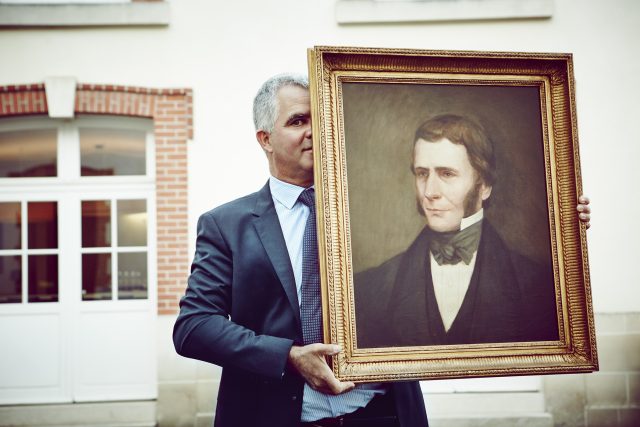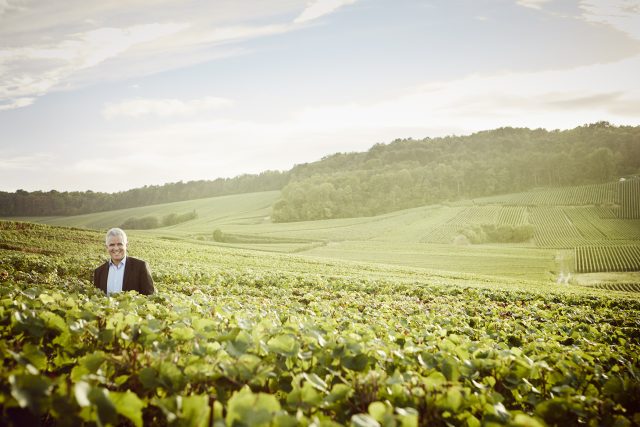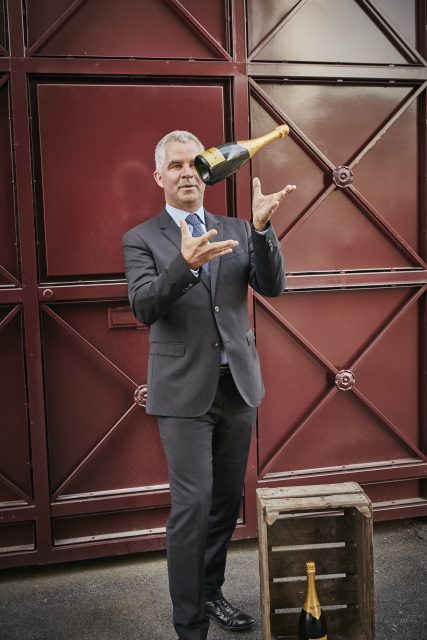This website uses cookies so that we can provide you with the best user experience possible. Cookie information is stored in your browser and performs functions such as recognising you when you return to our website and helping our team to understand which sections of the website you find most interesting and useful.
Olivier Krug: ‘staying relevant is a question of mindset, not age’
To celebrate the 180th anniversary of Krug Champagne, and the release of the 171st edition of the maison’s Grande Cuvée, director Olivier Krug speaks to Eloise Feilden about the family history, his Instagram following and the “witty” tone which keeps the Champagne house’s messaging fresh.

Olivier Krug, sixth generation director of the Krug Champagne house, is nothing if not a storyteller. The history of his family’s maison is imprinted as much on his tongue as it is in his DNA. Tales of his bygone ancestors pour out of him as he speaks; tales of the Champagne house’s founder Joseph Krug and his wife Emma, who, according to family legend, told her husband, aged 42, that he was too old to be ambitious. Tales of their son Paul, sent to London at 18 to live with an importer there and send word of sales back to his father in Reims. More recent stories, too, of how Olivier’s father and uncle ran the show before he himself joined the fold more than three decades ago.
For a man with so many generational boots to fill (and only two feet), Olivier Krug has an impressive pep in his step.
“I don’t buy at all into the old and young thing. My age is old, but I feel I’m young,” says the 56-year-old. His approach to the brand’s image reflects his ‘young at heart’ attitude. For the past 10 years the Champagne maison’s director has been focused on getting the story out there, leaving the technical details to the experts.
“For 170 years we’ve only talked about the craft, but what is Krug? People say ‘Krug is a Champagne which is crafted…blah blah blah’. No. Krug is a dream of a man,” he says.
The ‘dream of a man’ has become Olivier Krug’s catchphrase, repeated ad nauseam over a two-day visit to the family house in Reims in May, but this is all part of the marketing message. “I tell all my teams, if you don’t say ‘dream of the man’ in every sentence you’re not talking about Krug. You’re explaining how it is made but you’re not explaining what it is.”
The idea is to do away with all the jargon; all the technical information which consumers are often bombarded with when learning about a wine.
“Twenty years ago anyone would have explained Krug in a technical way, which is very boring; which is jargon” he says. “It speaks only to the people who can understand this language, and the people who can understand this language already know Krug.”

Technical information is, of course, available to those of us wanting to geek out on the dosage and disgorgement dates of any given bottle, accessed via a ‘Krug iD’ number on the back of every bottle.
But when it comes to consumers, or ‘Krug Lovers’ as Olivier affectionately calls them, he is all about the storytelling. “A lot of people talk about technicality because there is nothing else to say,” he explains, his own vocabulary choc full of emphatic language designed to draw people in.
His description of the wine itself is imbued with phrases like a “firework of aroma” and an “explosion of flavour”, making it clear why he has such a passionate fanbase, and some 43,000 Instagram followers. “No one in the wine industry has more followers than I have,” he says, without a hint of self consciousness.
The longevity of the brand is dependent upon this messaging. Olivier likens his role to that of a chef — “a cook can be excellent and his restaurant can be empty”, he says, by way of explaining how key marketing is to the success of any brand.
“Maybe in five years we don’t need to tell the story of Joseph Krug anymore. Maybe people know that Krug is crafted to offer every year the most generous expression of Champagne, and they won’t need the background.” But this isn’t the case just yet.
The sixth generation Champagnois laments the “wine snobbery” which proliferates the way we talk about wine. You will lose people if “they ask you for great Champagne and you try to sell wine”, he claims, before plunging into a detailed description of the “drama” of the 2003 vintage — its harsh April frosts and long summer drought. All this to illustrate his point: the best way to sell people wine is to involve them in its story.

This year Krug is celebrating its 180th anniversary, as well as the release of the 171st edition of Krug Grande Cuvée, a blend of 131 wines from 12 different years, the youngest of which is from 2015, and the oldest of which dates back to 2000. The wine retails for £225 a bottle.
For a brand with almost two centuries of history, the messaging is surprisingly modern, but Olivier says this all happens naturally. “There is no plan to keep it new,” he claims, explaining that the reason consumers remain engaged is because “we know exactly who we are”.
“When we define the tone of Krug internally we very often use the word witty,” Olivier says. “That’s the reality of the team here.” Indeed, the winemaking team at the maison, led by cellar master Julie Cavil, is both more youthful and more tech savvy than its predecessors.
“She’s French, she’s a woman, and my team is much younger,” says Olivier. “She probably has a different way to connect to people and to deal with the growers.”
But, Olivier reiterates, age is just a number. “It’s a question of mindset, it’s not a question of age,” he shrugs.
The sixth generation director of the Moet Hennessy-owned brand has a knack with words, and understands how consumers think. Ultimately the goal is simple — to sell Champagne. Olivier is clear about this right up to his final word: “We know what we want. We want to offer, every year, the best possible Champagne. The rest comes naturally.”

